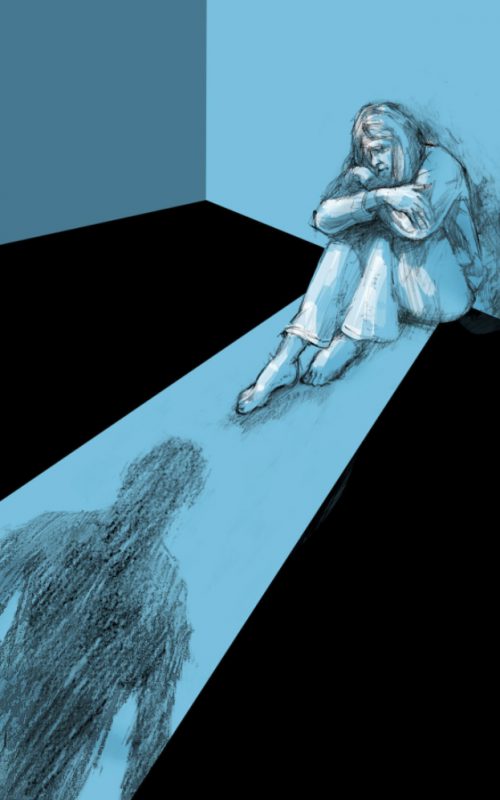In the 1991 movie “Beauty and the Beast,” Belle, the leading lady, is kidnapped by a large beast. The beast is controlling and demanding; he roars at her, violently swipes at her. He even starves her when she doesn’t do what he wants. She eventually develops feelings of sympathy, affection and even trust for her captor, the beast.
Since California’s shelter-in-place order was put in place by Gov. Gavin Newsom March 19, he said that an increase in domestic violence has occurred.
“Domestic violence and intimate partner battering are seeing increases in times of stress,” said Newsom in a news briefing April 7.
As the City College WEAVE confidential advocate, Calla Gilligan explained that the situation in the Disney film is an example of Stockholm Syndrome, a condition in which kidnapped victims form an attachment and psychological alliance to their captors.
“This is what a trauma bond looks like,” said Gilligan. “It’s my understanding that a trauma bond is similar to Stockholm Syndrome where a person feels compassion towards the person holding them hostage. There are those that famously compare ‘Beauty and the Beast’ as a perfect example of Stockholm Syndrome.”
This syndrome results in a person altering their own behavior to avoid being hurt while captive. It is a way to protect a person’s mind in a trauma situation. Gilligan said that a trauma bond is similar because the survivor uses a similar survival strategy, except it happens with those in intimate partnerships.
“In a healthy relationship there is equal power, consent, communication, trust and empathy,” said Gilligan. “In a one-sided relationship, where one person has the majority of the power and the other person becomes dependent, it can lead to abuse. Abuse tactics include isolation, financial, sexual, verbal and technological abuse.”
According to calmatters.org, there has been an increase of domestic violence in Fresno, which has gone up 77% week over week in April. Due to the increase in calls to domestic violence shelters, eight legislators requested that Newsom provide emergency funding for domestic violence shelters, April 14. New Times San Luis Obispo, from the website newtimesslo.com, reported that as of April 15Newsom had not yet responded to this request.
According to the U.S. Centers for Disease and Control and Prevention, before the shelter-in -place order, one out of five women and one in seven men suffered violence at the hands of their partners. However, since this pandemic has occurred, domestic violence has increased globally, according to The New York Times. The Times also reported that domestic violence in China has doubled since cities went on lockdown. On Chinese social media #AntiDomesticViolenceDuringEpidemic has been trending.
According to Gilligan, isolation plays a factor in how abusers maintain power and control.
“If you are in a situation where you are completely isolated, that is going to escalate the situation of abuse because you don’t have access to the support and resources that you normally would have,” said Gilligan. “Survivors are more isolated now because of the shelter-in-place order, and there is an increase in stress with finances and children being at home 24 hours a day that can impact the intensity of the violence. Also, children may witness abuse that they don’t normally see.”
Gilligan worked for WEAVE for the last six years and has been an advocate since this spring, offering non-judgmental, confidential emotional support to Los Rios district students, faculty and staff. WEAVE is a non-profit organization based in Sacramento that offers crisis intervention, education, legal and therapeutic services for survivors of domestic violence, sexual assault and sex trafficking, according to the WEAVE website.
Before the campus closures, GilliganCalla would visit each campus one day a week, connecting people in need to services and resources.
“There are a lot of things that go into an unhealthy relationship. A lot of times it is unsafe to leave, and there can be a reason why a person stays,” said Gilligan. “There can be financial factors, or there could be children involved. It doesn’t happen overnight, and it takes time for that manipulation and abuse to occur. It typically takes seven to 10 times to leave. We are not a judgmental space. We will not tell them what to do. We are here to listen and offer support where they are at.”
Gilligan said that she keeps all personal information confidential because she is not a mandated reporter. Mandated reporters, such as therapists, are legally required to report abuse that is observed or suspected.
Abusive relationships run in a cycle of violence, Gilligan explained.
“It is where there is tension building, an explosion, and then the honeymoon phase where everything is amazing and perfect. During the tension-building phase you feel like you are walking on eggshells, and you know something is going to happen, but you don’t know when the explosion is going to happen,” said Gilligan. “Then the explosion happens, and it could be a verbal altercation or a physical or sexual attack. Then it goes back to the honeymoon stage. This cycle can happen over and over, and this can really impact how your brain functions.”
Those who are abused and traumatized suffer from high levels of stress, which is known to affect areas of the brain that are associated with memory function Gilligan said.
“A lot of people who are survivors commonly have issues of memory loss, especially soon following the incident,” said Gilligan. “This makes reporting really complicated because a lot of times law enforcement are asking for specific details and timelines, and immediately after trauma it is common to have memory gaps or not a clear memory because your brain is trying to protect you from what just happened to you. It could be many years later or while in counseling where you will remember. Trauma can change your brain. It can change how you think, how you process, and how you react to things. That is why processing your trauma is so important. And that is why we offer great counseling services to help process and develop coping skills in a safe environment.”
WEAVE offers 24-hour phone support at (916)-920-2952. It also offers phone counseling, legal help, shelter and children’s therapy. For those who are unable to take private phone calls, WEAVE offers live person-to-person chats. This feature is on the WEAVE website and is available daily 8:30 a.m.–9 p.m.
For resources on domestic abuse (and other mental and physical health issues), more than 170 languages and 16 different hotlines can be found on the COVID19.CA.gov website.

































